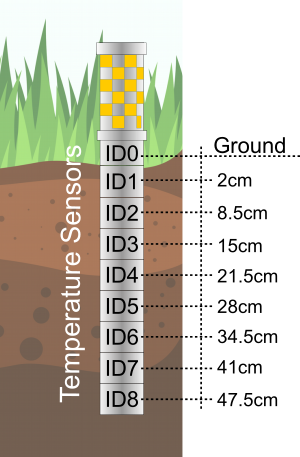
Die Einsatzmöglichkeiten von drahtlosen Sensornetzen sind ebenso vielfältig wie herausfordernd. So dienen z.B. in der Landwirtschaft verteilte Sensoren zur Überwachung des Pflanzenwachstums oder zur Bodenanalyse. Hier ist die Robustheit - sowohl der einzelnen Sensorknoten als auch des gesamten Sensornetzes - essentiell für eine erfolgreiche Projektdurchführung bzw. für diverse "Smart Farming"-Ansätze. Dabei haben nahezu alle Umwelteinflüsse auch einen direkten oder indirekten Einfluss auf die Lebensdauer der Knoten bzw. des Netzes; zusätzlich treten in Outdoor-Szenarien starke Schwankungen dieser Umgebungsbedingungen auf. So werden bspw. bedingt durch Sonneneinstrahlung auf einzelnen Sensorknoten Temperaturunterschiede von bis zu 56°C innerhalb eines Tages erreicht, wobei sich außerdem eine starke Heterogenität der Temperaturen zwischen den einzelnen Knoten eines Netzes zeigt.
Um einen längerfristigen Einsatz zu ermöglichen, sollte ein Sensornetz, das solchen Umweltbedingungen unterliegt, besonders robust gegenüber diesen sein und insbesondere die Energieversorgung der einzelnen Knoten gewährleisten. Robustheit wird dabei unter anderem durch eine weitestmögliche Verringerung des Energiebedarfs bzw. Anpassung des Bedarfs an die Erzeugung (oder umgekehrt) erreicht. Des Weiteren können auch einzelne Funktionen (bspw. Aufnehmen, Speichern und Verarbeiten von Daten) - zum einen auf einzelnen Knoten und zum anderen innerhalb des Netzes - zeitlich und örtlich an die jeweiligen Umwelt- und damit Energiebedingungen angepasst und einzelne Aufgaben verschoben werden. Insbesondere in Outdoor-Szenarien ergibt sich dadurch die Situation dass a) manche Knoten aufgrund ihrer aktuellen Temperatur und ihrer individuellen Eigenschaften energieeffizienter als andere Knoten arbeiten können (Heterogenität im Netz) und b) sich ändernde Umgebungsbedingungen (bspw. Sonne/Schatten oder Tag/ Nacht) zu einer dynamischen Veränderung der Energieeffizienz einzelner Knoten oder des gesamten Netzes führen. Auch die Möglichkeiten des Energy-Harvestings unterliegen einer Dynamik.
Durch die kontinuierliche Beobachtung der Umwelt lässt sich Nutzen aus dieser Dynamik ziehen. Realistische Energie- und Zuverlässigkeitsmodelle (hier abgeleitet aus Messwerten) können zusammen mit Informationen über die im Netz befindlichen Knoten auch für Entscheidungen bei der Wegewahl, Aufgabenverteilung und Bearbeitung innerhalb des Netzes genutzt werden. Durch Prädiktion der Umgebungsvariablen lassen sich zusätzlich geeignete Zeitpunkte für rechenintensive Operationen oder für Datenweiterleitung in verzögerungstoleranten Netzen bestimmen. Dafür werden spezifische Scheduler und Routing-Protokolle entwickelt, welche den robusten Betrieb des dynamischen Einflüssen ausgesetzten Sensornetzes ermöglichen. Eine kontinuierliche Evaluation erfolgt in realen Umgebung.

This experiment was used to measure the soil temperature in different depths. Using this

The reaper is a test platform for energy harvesting. Its purpose is to provide a generic interface for energy sources and energy storages. Commonly used are super capacitors as storage and solar panels or peltier elements for harvesting.
Additionally, the platform integrates a programmable voltage supply, a secure co-processor and a generic header for the base board holding the actual MCU.
The platform allows to test different MCUs in an energy harvesting sensor node.
| Name | Telefon | Raum | |
|---|---|---|---|
| Robert Hartung | hartung[[at]]ibr.cs.tu-bs.de | ||
| Prof. Dr. Ulf Kulau | kulau[[at]]ibr.cs.tu-bs.de | ||
| Prof. Dr. Felix Büsching | f.buesching[[at]]ostfalia.de | +49 531 3913289 | 111 |
| Prof. Dr.-Ing. Lars Wolf | wolf[[at]]ibr.cs.tu-bs.de | +49 531 3913288 | 138 |
| Titel | Art | Betreuer | Status |
|---|---|---|---|
| Porting IdealVolting to the RIOT Operating System with respect to utilizing low power management | Projektarbeit | Robert Hartung, Prof. Dr. Ulf Kulau | abgeschlossen |
| Development of a battery test card to measure temperature effects on batteries | Masterarbeit | Robert Hartung | abgeschlossen ~2017 |
| Optimierung, Parallelisierung und Erweiterung des COOJA-Simulators | Teamprojektarbeit | Robert Hartung | abgeschlossen ~2017 |
| Battery modelling with respect to temperature | Bachelorarbeit | Robert Hartung | abgeschlossen ~2019 |
| Online Modellbildung auf drahtlosen Sensorknoten unter Energie- und Speicherplatzgesichtspunkten, ... | Masterarbeit | Robert Hartung | abgeschlossen ~2018 |
| Entwicklung eines kontextabhängigen Ratings für Sensorknoten in drahtlosen Sensornetzwerken | Masterarbeit | Robert Hartung | abgeschlossen ~2018 |
| Entwicklung eines Micro-Source-Energy-Harvesters für Sensorknoten | Masterarbeit | Prof. Dr. Ulf Kulau | abgeschlossen ~2016 |
| Evaluation von transienten Knotenausfällen im FIT/IoT-Lab | Bachelorarbeit, Projektarbeit | Prof. Dr. Ulf Kulau | abgeschlossen |
| Datenerhebung von IEEE 802.15.4 Radios unter verschiedenen Temperatureinflüssen | Bachelorarbeit | Prof. Dr. Ulf Kulau, Robert Hartung | abgeschlossen ~2016 |
| An adaptive prediction approach for low power WSN | Masterarbeit | Prof. Dr. Ulf Kulau | abgeschlossen ~2017 |
| Abhärtung des RPL-Protokolls gegen transiente Knotenausfälle | Masterarbeit | Prof. Dr. Ulf Kulau | abgeschlossen ~2016 |
| Energy Harvesting für Sensorknoten unter Nutzung der Bodentemperatur | Bachelorarbeit | Prof. Dr. Ulf Kulau | abgeschlossen |
| RPL Objective Function to optimize the lifetime of Wireless Sensor Networks | Masterarbeit | Robert Hartung | abgebrochen |
Bei Interesse an einer Projekt-, Bachelor-, Master- oder sonstiger Arbeit im Bereich dieses Projekts bitte einfach Robert Hartung kontakieren.
 Dieses Forschungsvorhaben wird unter der Fördernummer BU 3282/2-1 durch die Deutsche Forschungsgemeinschaft (DFG) gefördert.
Dieses Forschungsvorhaben wird unter der Fördernummer BU 3282/2-1 durch die Deutsche Forschungsgemeinschaft (DFG) gefördert.
Technische Universität Braunschweig
Universitätsplatz 2
38106 Braunschweig
Postfach: 38092 Braunschweig
Telefon: +49 (0) 531 391-0